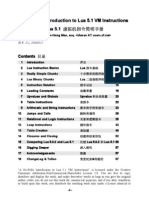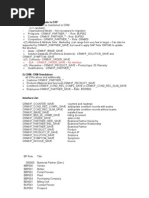SAP CRM Concepts
SAP CRM Concepts
Uploaded by
SimranCopyright:
Available Formats
SAP CRM Concepts
SAP CRM Concepts
Uploaded by
SimranOriginal Description:
Copyright
Available Formats
Share this document
Did you find this document useful?
Is this content inappropriate?
Copyright:
Available Formats
SAP CRM Concepts
SAP CRM Concepts
Uploaded by
SimranCopyright:
Available Formats
Go to start of metadata
CRM Business Transactions
Introduction
As a depature from regular ERP "fat table" design, CRM embraces a new data model concept for business transactions called the "oneorder" concept. The one order concept is relatively simple, yet very elegant. Each busines transaction type is store in common set of
tables which we will call segments, and then has segments specific to the business transaction type. This means a sales order, activity,
lead, opportunity, complaint, etc. all live in the same central tables. This allows for an easier technical copy control and search. The order
guid is used to handle this.
Basic Data Model
Let's a take a look at the structure of a business transaction
Primary Header Table: CRMD_ORDERADM_H which is also known as ORDERADM_H
Primary Item Table: CRMD_ORDERADM_I which is known as ORDERADM_I
These tables are then related to various segments through a linkage table known as CRMD_LINK. Examples of segments are
CRMD_ACTIVITY_H and CRMD_PRODUCT_I.
Extensions to Data Model
The header of a business transaction and items of a business transaction can be extended using the EEWB. By using this tool it is
recommend to extend the tables CRMD_CUSTOMER_H and CRMD_CUSTOMER_I. These segments are considered fully qualified
segments of the business transaction and have all the other features as a regular segment of the transaction. By using these segments via
the EEWB, we can re-use the fields throughout the whole CRM application without much extra effort.
The fields are added via the customing includes that are named in the fashion CI_EEW_CUSTOMER_H and CI_EEW_CUSTOMER_I.
BADI Framework for Business Transactions
Each segment offers a badi for validating the segment and adding additional fields of the segment. The badi's follow the convention
CRM_<segment>_BADI except for PARTNER and PAYPLAN segments which start with COM.
In addition the following BADI's are available:
CRM_COPY_BADI - Copy Control
ORDER_SAVE - manipulate data before save
Please keep in mind in all badi's should not call any SAVE related function modules. You should use the *_OB api function modules to
modify the data at this layer to avoid recursion errors. Also please keep in mind that badi for a segment is only triggered when the data in
that segment has been updated or "touched".
Event Framework
The event handler framework is used by the CRM business transaction framework to notify changes within the transaction to other
segments within. The event framework can be accessed through transaction CRMV_EVENT. You can determine what events are called
as a business transaction is edited by setting the user parameter CRM_EVENT_TRACE to 'X' on your userid. The report
CRMV_EVENT_TRACE will allow you to see the results. The event framework is quite useful when a badi will not meet your requirements.
API's & BAPI's for business transactions
SE37: CRM_ORDER_MAINTAIN & SE38: CRM_ORDER_MAINTAIN
CRM_<SEGMENTNAME>_OW
CRM_<SEGEMENTNAME>_READ_OW
CRMXIF_ORDER_SAVE
CRMXIF_ORDER_EXTRACT
PRODUCT MASTER DATA - Three important tables
COMM_PRODUCT
COMM_PR_FRG_REL
COMM_PRMAT
Technically a product does not have any segments until assigned to product category!!! The product subtype hierarchy R3PRODSTYP
defines this i.e MAT_FERT which has:
COMM_PR_MAT
COMM_PR_UNIT
You must assign a product a valid category before you can assign it segment data!
In CRM all types of partners (sold-to, ship-to, prospect, vendor, etc) are considered business partners. This allows for us to use partners in
transactions based on roles they occupy.
Data Model
We call Business Partners: "BUPA's" per naming convention in CRM
Central Data stored in BUT000
Most tables/segments start such as BUT* or CRMM_BUT_*
Relationships stored in BUT050
Partner id is primary key BUPA guid is secondary key
Extensions are handled via the EEWB. Don't try to write these from scratch unless you know BDT and prefer doing things in
more painful fashion.
API's & BAPI's for the Business Partner
BAPI_BUPA_* or BUPA_*
Common ones are:
BAPI_BUPA_CREATE_FROM_DATA
BAPI_BUPA_ADDRESSES_GET
BAPI_BUPA_ADDRESS_GET_DETAIL
You might also like
- SAP Enterprise Structure Concept and Configuration Guide: A Case StudyFrom EverandSAP Enterprise Structure Concept and Configuration Guide: A Case StudyRating: 5 out of 5 stars5/5 (3)
- The Up & Away Advisors’ Guide to Implementing and Executing Sap’s Vehicle Management SystemFrom EverandThe Up & Away Advisors’ Guide to Implementing and Executing Sap’s Vehicle Management SystemNo ratings yet
- Enhance The CRM WebClient UI With Custom Fields PDFDocument10 pagesEnhance The CRM WebClient UI With Custom Fields PDFBhattahcarjee RupakNo ratings yet
- 1 OrderDocument44 pages1 OrderVenki KasaNo ratings yet
- Sap b1 Doc AllDocument1,289 pagesSap b1 Doc AllCasper CruzNo ratings yet
- BADI - MATERIAL - CHECK Which Can Be Use For Our RequirementDocument5 pagesBADI - MATERIAL - CHECK Which Can Be Use For Our RequirementRupakbhattacNo ratings yet
- Lua 5.1 虚拟机指令简明手册Document90 pagesLua 5.1 虚拟机指令简明手册董旭No ratings yet
- CRM Technical Laundry List: Stephen JohannesDocument37 pagesCRM Technical Laundry List: Stephen JohannesraghuvlkNo ratings yet
- Call FunctionDocument14 pagesCall Functionkumarm1981No ratings yet
- CR712011 CRM Abap V1 4Document95 pagesCR712011 CRM Abap V1 4arunkumarmararNo ratings yet
- Can'T Find A Badi To Handle A Requirement? Try The Event HandlerDocument14 pagesCan'T Find A Badi To Handle A Requirement? Try The Event Handlerdeejay217No ratings yet
- Sap CRM Technical OverviewDocument5 pagesSap CRM Technical Overviewkenguva_tirupatiNo ratings yet
- Enhanced Integration With CRMDocument7 pagesEnhanced Integration With CRManuragrathoreNo ratings yet
- CRMXIFDocument5 pagesCRMXIFZhao YongNo ratings yet
- SAP CRM Interview QuestionsDocument7 pagesSAP CRM Interview QuestionsSush PandeyNo ratings yet
- SAP CRM Interview Questions & AnswersDocument7 pagesSAP CRM Interview Questions & AnswersDavid VaseNo ratings yet
- CRM-DBM Integration Consulting NoteDocument9 pagesCRM-DBM Integration Consulting NoteGobi NagarajanNo ratings yet
- CRM Settings Configuration For Master Data ReplicationDocument11 pagesCRM Settings Configuration For Master Data Replicationshyamg4uNo ratings yet
- Quick Guide To Enhanceing ElmDocument10 pagesQuick Guide To Enhanceing ElmmarkyrayNo ratings yet
- SAP CRM Overview - Architecture: IBM Global Business ServicesDocument57 pagesSAP CRM Overview - Architecture: IBM Global Business ServicesGK SKNo ratings yet
- Sap Isu - CRM Facts - ServiceDocument18 pagesSap Isu - CRM Facts - ServiceArun KumarNo ratings yet
- Service CRM PDFDocument54 pagesService CRM PDFRajib BoseNo ratings yet
- Vtiger510:Usermanual: O O O O O O O O O O O ODocument124 pagesVtiger510:Usermanual: O O O O O O O O O O O OWilliam Apple PiousNo ratings yet
- Extended Bol Model BT With Custom Table Type Relation ShipDocument12 pagesExtended Bol Model BT With Custom Table Type Relation ShipsumanthkonetiNo ratings yet
- Setting Up CRM Middleware: Step 1 - Define Logical Systems (CRM)Document7 pagesSetting Up CRM Middleware: Step 1 - Define Logical Systems (CRM)fsimovic100% (1)
- CRM Orders ArchivingDocument5 pagesCRM Orders ArchivingRitika JainNo ratings yet
- Business AgreementDocument3 pagesBusiness AgreementGaurav ChughNo ratings yet
- Billing IntegrationDocument74 pagesBilling IntegrationRajib BoseNo ratings yet
- BBFDFDocument29 pagesBBFDFAnonymous Yw2XhfXvNo ratings yet
- SAP CRM Service Billing ConfigurationBilling ConfigurationDocument10 pagesSAP CRM Service Billing ConfigurationBilling Configurationauml20042003No ratings yet
- SAP CRM Interview Questions and Answers: Learning IT Courses Has Never Been This EasyDocument14 pagesSAP CRM Interview Questions and Answers: Learning IT Courses Has Never Been This EasyHari Hara KumarNo ratings yet
- Replication of BP Contacts in SAP ECC With Activities in SAP CRM - ExampleDocument6 pagesReplication of BP Contacts in SAP ECC With Activities in SAP CRM - Examplesouban7-1No ratings yet
- Change Order - CRM - ORDER - MAINTAIN - Toolbox For IT GroupsDocument3 pagesChange Order - CRM - ORDER - MAINTAIN - Toolbox For IT GroupssumanthcrmNo ratings yet
- Set Up & Loag Guide For BP Agreements - Contract Accounts - SLG - GP - ISU - V2Document3 pagesSet Up & Loag Guide For BP Agreements - Contract Accounts - SLG - GP - ISU - V2rushikesh28No ratings yet
- Sizing FAQDocument59 pagesSizing FAQMarcos Vinícius Ayala MateosNo ratings yet
- CRM Tables PDFDocument3 pagesCRM Tables PDFhermyharry123No ratings yet
- Basic Settings in CRM Middle Ware For The Data Exchange With ERP R3 SystemDocument15 pagesBasic Settings in CRM Middle Ware For The Data Exchange With ERP R3 SystemSam CostusNo ratings yet
- Microsoft Word - Enhance The CRM WebClient UI With Custom Fields2Document21 pagesMicrosoft Word - Enhance The CRM WebClient UI With Custom Fields2Peter Van AlphenNo ratings yet
- Sap SD ConfigDocument363 pagesSap SD Configgopi226No ratings yet
- SAP CRM Technical Tutorials by Naval BhattDocument27 pagesSAP CRM Technical Tutorials by Naval BhattBabu DeepNo ratings yet
- Microsoft Dynamics CRM Architecture OverviewDocument7 pagesMicrosoft Dynamics CRM Architecture OverviewVijay VRNo ratings yet
- SAP CRM Business Transactions: What ?Document7 pagesSAP CRM Business Transactions: What ?harikrishna82No ratings yet
- Important Steps To Perform CRM-ECC Int Erg Ration - CRM Middle WareDocument7 pagesImportant Steps To Perform CRM-ECC Int Erg Ration - CRM Middle WareAmit AggarwalNo ratings yet
- CRM - Tables and Transaction Codes SAP - BYTEDocument39 pagesCRM - Tables and Transaction Codes SAP - BYTEArijit Nayak100% (1)
- Cookbook For Enhancements of Case ManagementDocument12 pagesCookbook For Enhancements of Case ManagementHatshepsutKNo ratings yet
- SapsdmaterialDocument367 pagesSapsdmaterialNaresh BitlaNo ratings yet
- Sap DBMDocument4 pagesSap DBMamitsj100% (1)
- ElmDocument19 pagesElmanijaniNo ratings yet
- Sap TPMDocument29 pagesSap TPMsaha_sitorusNo ratings yet
- Easy Enhancement Work Bench: IBM Global Business ServicesDocument31 pagesEasy Enhancement Work Bench: IBM Global Business ServicesGK SKNo ratings yet
- Creating Installed Base With ABAP TooDocument11 pagesCreating Installed Base With ABAP TooPrashant VijayNo ratings yet
- CRM Incentive and Commission ManagementDocument32 pagesCRM Incentive and Commission Managementdexter_83_No ratings yet
- 6 Steps To Enhance A CRM DataSource Using A BDoc BAdIDocument8 pages6 Steps To Enhance A CRM DataSource Using A BDoc BAdISarfraz MohammedNo ratings yet
- Tugas Sap SD Azura TasyaDocument4 pagesTugas Sap SD Azura TasyaREG.A/0218101521/ANISA ARMADIANANo ratings yet
- CRMMDocument14 pagesCRMMRamya ThurimerlaNo ratings yet
- Fin FSCM CCD 3Document4 pagesFin FSCM CCD 3car_pierreNo ratings yet
- Difference Between Party and CustomerDocument28 pagesDifference Between Party and CustomerNagarajuNo ratings yet
- Building Expert Business Solutions with Zoho CRM: An indispensable guide to developing future-proof CRM solutions and growing your business exponentiallyFrom EverandBuilding Expert Business Solutions with Zoho CRM: An indispensable guide to developing future-proof CRM solutions and growing your business exponentiallyNo ratings yet
- Siebel Incentive Compensation Management ( ICM ) GuideFrom EverandSiebel Incentive Compensation Management ( ICM ) GuideNo ratings yet
- SyllabusDocument48 pagesSyllabusSaksham Mahnot JainNo ratings yet
- Unit 3 2 MarkDocument10 pagesUnit 3 2 MarkGowthamanNo ratings yet
- Odre de Réparation (OR) (Workshop - Maintenance.order)Document46 pagesOdre de Réparation (OR) (Workshop - Maintenance.order)Bezzaouya MustaphaNo ratings yet
- 100 Java Programs With Output Useful Collection of Java Programs - Aniket PataskarDocument112 pages100 Java Programs With Output Useful Collection of Java Programs - Aniket Pataskarnandhuln86% (64)
- Cs 473 2014 Fall SyllabusDocument2 pagesCs 473 2014 Fall SyllabusHannaLaneNo ratings yet
- 14.module4 - PHP FILE EMAIL NEW - 12 PDFDocument32 pages14.module4 - PHP FILE EMAIL NEW - 12 PDFjustadityabistNo ratings yet
- Insertion Sort Bubble Sort Selection SortDocument31 pagesInsertion Sort Bubble Sort Selection SortAnithaNo ratings yet
- IAT-I Question Paper With Solution of 18CS71 Artificial Intelligence and Machine Learning Oct-2022-Dr. Paras Nath SinghDocument7 pagesIAT-I Question Paper With Solution of 18CS71 Artificial Intelligence and Machine Learning Oct-2022-Dr. Paras Nath SinghBrundaja D NNo ratings yet
- Web Programming Using PHP Oct 2021Document2 pagesWeb Programming Using PHP Oct 2021vanihbaabhinav77No ratings yet
- File HandlingDocument12 pagesFile HandlingNandita SharmaNo ratings yet
- QR Code Generator and Detector Using PythonDocument8 pagesQR Code Generator and Detector Using Python18X435 MadhuriNo ratings yet
- SYMLINKSDocument15 pagesSYMLINKSturtur luctusNo ratings yet
- Bash Reference ManualDocument250 pagesBash Reference Manualkhalid anjumNo ratings yet
- 12computer Science-Python Libraries and Idea of Efficiency-NotesDocument14 pages12computer Science-Python Libraries and Idea of Efficiency-NotesEshaNo ratings yet
- Compiler Design Final NotesDocument22 pagesCompiler Design Final NotesVictor SarmacharjeeNo ratings yet
- Compression: Safeen H. Rasool Assist. LecturerDocument27 pagesCompression: Safeen H. Rasool Assist. Lecturerasmahan abdulwahidNo ratings yet
- SONiC Unit Test and Function Test Enhancement - EdgecoreDocument22 pagesSONiC Unit Test and Function Test Enhancement - Edgecorengotu142No ratings yet
- Week 2 Assignment Solution: Software TestingDocument5 pagesWeek 2 Assignment Solution: Software TestingAparna GoliNo ratings yet
- SC OR111 3 - ExamDocument3 pagesSC OR111 3 - ExamTuan LeNo ratings yet
- Answers To Core Java Interview QuestionsDocument142 pagesAnswers To Core Java Interview Questionsansuman mahapatraNo ratings yet
- Lab 4 DatabaseDocument4 pagesLab 4 DatabasePritam DasNo ratings yet
- QT Selenium Course ContentDocument7 pagesQT Selenium Course ContentjagebNo ratings yet
- Complete Lab ManualDocument76 pagesComplete Lab Manualwajhi khanNo ratings yet
- Chapter 12Document34 pagesChapter 12Thanh Van DaoNo ratings yet
- Problem: Write A Kids Play Program That Prints The Capital of A Country Given The Name of The CountryDocument28 pagesProblem: Write A Kids Play Program That Prints The Capital of A Country Given The Name of The CountryluckyNo ratings yet
- Optimal Binary Search Tree: Kalyani C.WaghmareDocument10 pagesOptimal Binary Search Tree: Kalyani C.Waghmareatharva somanNo ratings yet
- Nested SubprogramsDocument11 pagesNested SubprogramsNone NoneNo ratings yet
- Transportation ProblemDocument41 pagesTransportation ProblemAyalew TayeNo ratings yet

























































































